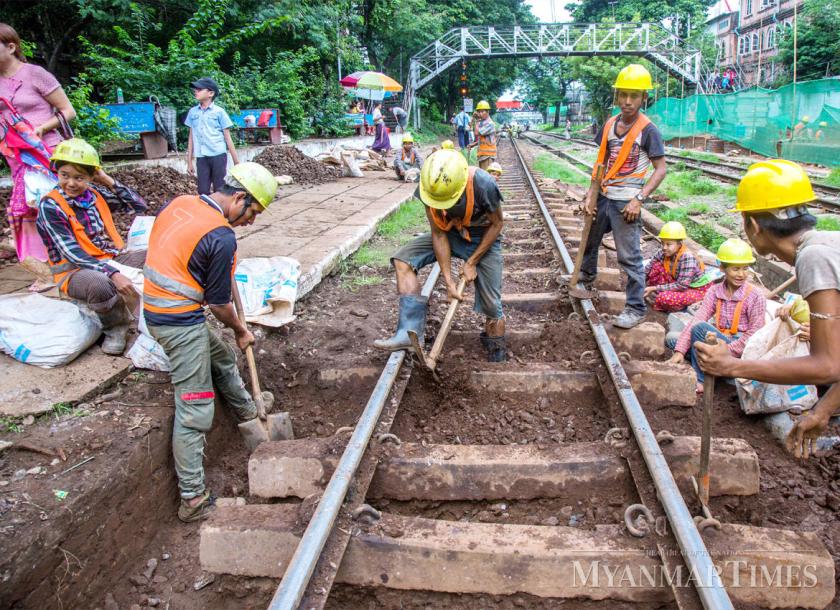Skirmishes prompt concerns, debate over major railroad project
Investor interest in building a railway project linking Mandalay to Muse, the largest trading post between Myanmar and China, is expected to wane due to security challenges along the border, analysts and observers said.
The risks of disruption may deter most investors from tendering for the project, leaving China, which is seen as best being able to contain the armed skirmishes taking place near its border, as the remaining bidder. Without any competition, concerns are now mounting that quality will suffer and that costs of borrowing from the Chinese to complete the railway will also be unfavorable to Myanmar.
The Muse-Mandalay Railroad project is a part of the Kunming-Muse-Mandalay-Kyaukphyu high-speed railroad project proposed by China under the China-Myanmar Economic Corridor (CMEC). The project, estimated to involve up to US$8.9 billion in investments, is expected to span over 430 kilometres and allow train travel at a speed of 160kmh. A total of seven depots and five train stations will be built along the railroad, which will pass through 11 townships.
A technical report following a feasibility study and relevant impact assessments on the Muse-Mandalay railway have already been submitted to the government by China Railway Eryuan Engineering Co (CREEC), U Htaung Shan Khan, general manager of planning and administration for Myanmar Railways, told The Myanmar Times earlier this year.
Up until August, when violence broke out between armed ethnic groups and the Tatmadaw (military) in northern Shan State near the border, an international tender for the construction of the project was expected to take place, pending a final decision by the authorities.
But those plans may now be in jeopardy, as the project passes through areas occupied by ethnic armed groups. The recent hostilities began on August 15 after Northern Alliance forces carried out coordinated attacks on military targets and civilian structures in Lashio, Nawnghkio, and Pyin Oo Lwin, near Mandalay. The attacks also caused severe damage to the Gotewin Bridge in Nawnghkio, an important trade route into China.
The conflict has now spread across the main Lashio-Muse Highway and is affecting civilians in Lashio, Hseni, Kutkai, Kyaukme, Nawnghkio, and Muse townships.
In local business circles, industry watchers are now debating the future of the project in view of the security challenges and rising uncertainty. “If the government cannot guarantee their security, it will be a concern for investors planning to participate in the tender. I don’t think they will dare to compete. They will be worried about the risk,” said U Ye Tun, a former Pyithu Hluttaw (House of Representatives ) MP and observer of China-Myanmar affairs.
While a decision has yet to be made on proceeding with the Muse-Mandalay Railroad project, whatever the case, “it is only if we assess the possible risks in advance, that we are able to prepare for and minimise them should they arise in the future,” said U Zaw Pe Win, a local economist.
He reckons that “since security cannot be guaranteed, it would be better if the project is carried out by the Chinese, as they exert a strong influence over the armed groups operating in Shan State and are better able to control security.”
In addition, “as Myanmar is unable to build the railway without help due to the many creeks, gullies and hills along the projected route, we will need to rely on expertise and funding from the Chinese,” U Zaw Pe Win added.
“The railway is an important component of the CMEC, for which State Counsellor Daw Aung San Suu Kyi and Chinese President Xi Jinping have agreed to cooperate on. With the Chinese on board, we have a better chance of securing the borders and ensuring domestic stability,” he said.
On the flipside, Chinese loans typically come with high interest rates and Myanmar risks falling into a debt trap if it over-leverages with Chinese borrowings.
The way U Ye Tun sees it, “if companies from other countries do not compete in the tender due to security issues, China will have more opportunities to win the tender. It will be one-sided competition and it may lead to over-pricing or quality issues.”
If foreign investors do end up passing on the project due to security concerns though, one of the potential solutions is to hold a tender for Chinese companies.
“If China ends up being the only contender for the project without any competition, it would be better to let Chinese companies compete with each other for the project under a build, operate and transfer system, while inspections on quality and determining the project value can be done with the help of an international third-party organisation,” U Ye Tun suggested. – Translated
More detail : https://www.mmtimes.com/news/skirmishes-prompt-concerns-debate-over-major-railroad-project.html
